Catalan crisis: did Russian hackers fuel separatism?
Fake social media accounts allegedly spread propaganda to stoke Spanish independence row
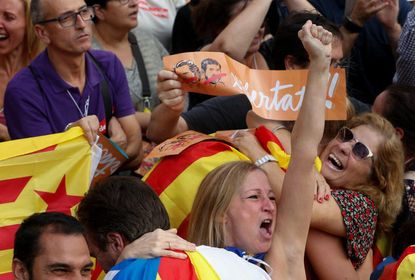
Spain’s struggle with Catalan separatists may have been exacerbated by Russian hackers engaged in a propaganda effort to divide Europe, it was reported yesterday.
The Spanish government-backed Elcano Royal Institute, in Madrid, says that unidentified Russian “troll” accounts spread inflamatory messages and claims - some true, some false - on social media in the run-up to the 1 October independence referendum.
“Russia has a nationalist agenda, and it supports nationalist, populist movements in Europe because that serves to divide Europe,” senior analyst Mira Milosevich told Bloomberg.
Subscribe to The Week
Escape your echo chamber. Get the facts behind the news, plus analysis from multiple perspectives.

Sign up for The Week's Free Newsletters
From our morning news briefing to a weekly Good News Newsletter, get the best of The Week delivered directly to your inbox.
From our morning news briefing to a weekly Good News Newsletter, get the best of The Week delivered directly to your inbox.
The Kremlin has used the Catalan crisis “to deepen divisions within Europe and consolidate its international influence”, Spanish newspaper El Pais reported in late September, days before the vote.
According to the paper, an influential tweet about the referendum posted by WikiLeaks founder Julian Assange - still languishing in Equator’s London embassy - went viral as a result of activity on fake social media accounts.
“We’re seeing foreign actors gain more of a voice in elections that are important to their interests,” Ben Nimmo, a senior fellow at the Atlantic Council think tank, told Politico shortly before the Spanish vote.
El Pais also claims that Russian news outlet RT used its Spanish-language portal “to spread stories on the Catalan crisis with a bias against constitutional legality”.
However, Spain’s ambassador to Russia told RT in October that Spain endorsed Russia’s stance and that the two nations enjoy “great relations”.
Create an account with the same email registered to your subscription to unlock access.
Sign up for Today's Best Articles in your inbox
A free daily email with the biggest news stories of the day – and the best features from TheWeek.com
-
 Andrew Fahie: the ex-BVI premier, cocaine-filled boats and drug trafficking plot
Andrew Fahie: the ex-BVI premier, cocaine-filled boats and drug trafficking plotUnder the radar Fahie's defense attorney claimed the British overseas territory leader was 'acting like the fictitious CIA agent Jason Bourne'
By Harriet Marsden, The Week UK Published
-
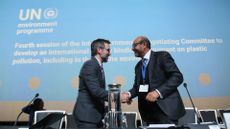 Ottawa climate talks: can global plastic problem be solved?
Ottawa climate talks: can global plastic problem be solved?In the spotlight Nations aim to draft world's first treaty on plastic pollution, but resistance from oil- and gas-producing countries could limit scope
By Harriet Marsden, The Week UK Published
-
 Netherlands split on WFH for sex workers
Netherlands split on WFH for sex workersSpeed Read Councils concerned over 'nuisance' of at-home sex work, but others say changes will curb underground sex trade
By Arion McNicoll, The Week UK Published
-
 Myanmar: the Spring Revolution and the downfall of the generals
Myanmar: the Spring Revolution and the downfall of the generalsTalking Point An armed protest movement has swept across the country since the elected government of Aung San Suu Kyi was overthrown in 2021
By The Week Staff Published
-
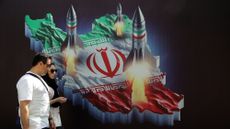 Israel hits Iran with retaliatory airstrike
Israel hits Iran with retaliatory airstrikeSpeed Read The attack comes after Iran's drone and missile barrage last weekend
By Peter Weber, The Week US Published
-
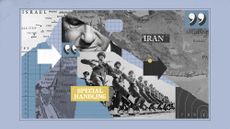 Is there a peaceful way forward for Israel and Iran?
Is there a peaceful way forward for Israel and Iran?Today's Big Question Tehran has initially sought to downplay the latest Israeli missile strike on its territory
By Sorcha Bradley, The Week UK Published
-
 Sudan on brink of collapse after a year of war
Sudan on brink of collapse after a year of warSpeed Read 18 million people face famine as the country continues its bloody downward spiral
By Peter Weber, The Week US Published
-
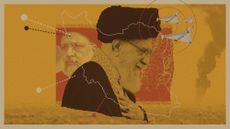 How powerful is Iran?
How powerful is Iran?Today's big question Islamic republic is facing domestic dissent and 'economic peril' but has a vast military, dangerous allies and a nuclear threat
By Harriet Marsden, The Week UK Published
-
 US, Israel brace for Iran retaliatory strikes
US, Israel brace for Iran retaliatory strikesSpeed Read An Iranian attack on Israel is believed to be imminent
By Peter Weber, The Week US Published
-
 How green onions could swing South Korea's election
How green onions could swing South Korea's electionThe Explainer Country's president has fallen foul of the oldest trick in the campaign book, not knowing the price of groceries
By Sorcha Bradley, The Week UK Published
-
 Ukraine's battle to save Kharkiv from Putin's drones
Ukraine's battle to save Kharkiv from Putin's dronesThe Explainer Country's second-largest city has been under almost daily attacks since February amid claims Russia wants to make it uninhabitable
By Sorcha Bradley, The Week UK Published